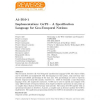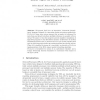52 search results - page 7 / 11 » Rule-Based Operational Semantics for an Imperative Language |
ER
2007
Springer
14 years 2 months ago
2007
Springer
Model transformations are playing a vital role in the field of model engineering. However, for non-trivial transformation issues most approaches require imperative definitions, w...
POPL
2010
ACM
14 years 5 months ago
2010
ACM
In functional programming, monadic characterizations of computational effects are normally understood denotationally: they describe how an effectful program can be systematically ...
ITNG
2010
IEEE
14 years 1 months ago
2010
IEEE
—In reservoir engineering domain experts deal with many tasks and operations, ranging from reservoir simulation to well maintenance scheduling, with the goal of maximizing oil pr...
KI
2006
Springer
13 years 7 months ago
2006
Springer
This document describes the `Geo-Temporal' specification language GeTS. The objects which can be described and manipulated with this language are time points, crisp and fuzzy...
ESOP
2004
Springer
14 years 1 months ago
2004
Springer
Abstract. We present PacLang: an imperative, concurrent, linearlytyped language designed for expressing packet processing applications. PacLang’s linear type system ensures that ...


